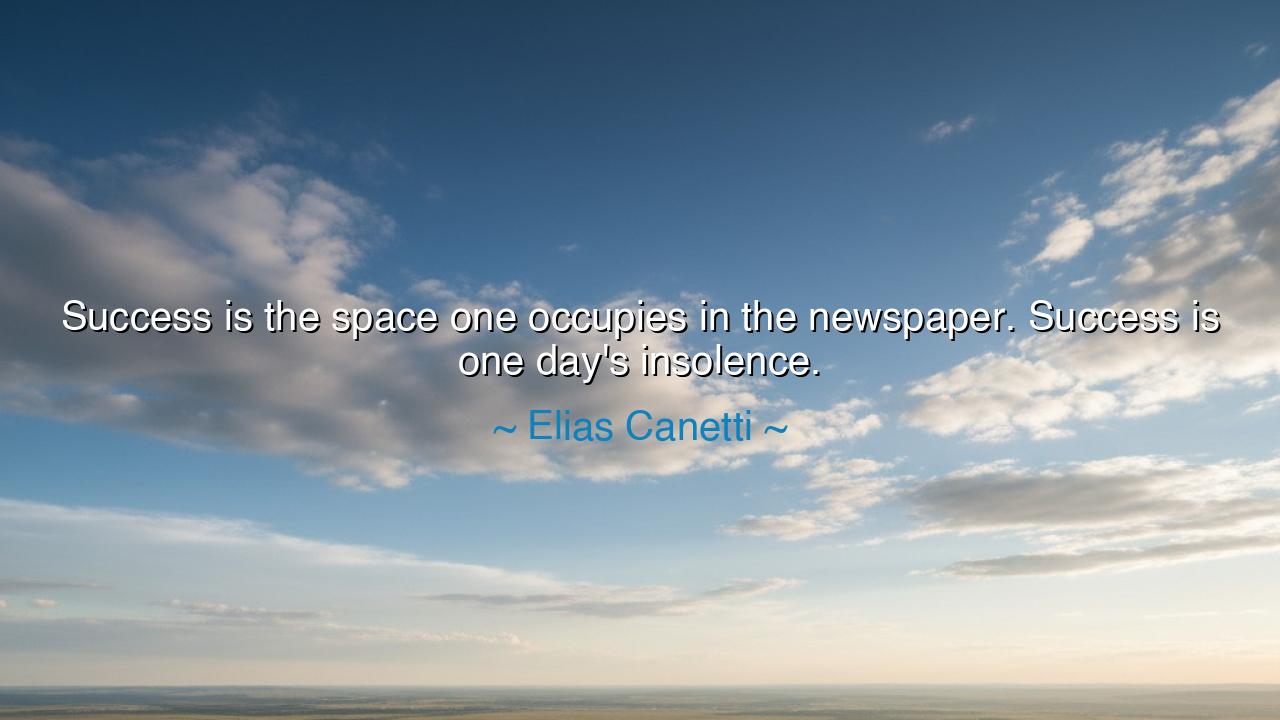
Success is the space one occupies in the newspaper. Success is






"Success is the space one occupies in the newspaper. Success is one day's insolence." These words from Elias Canetti offer a powerful reflection on the transient, often superficial nature of success. Canetti suggests that success is not a deep or lasting accomplishment, but a fleeting moment, something that can be reduced to the temporary attention one receives—often in the form of a headline or a mention in the newspaper. It is a brief, almost insolent assertion of one’s presence in the world, a moment of glory that is short-lived and perhaps even empty in its true significance. Canetti challenges us to reconsider our understanding of success, to question its true value, and to recognize that what we often celebrate as achievement may not be as substantial as we think.
In the ancient world, the concept of success was deeply tied to honor, virtue, and the lasting impact one left on society. Homer’s Iliad, for example, tells the stories of warriors like Achilles, who sought eternal glory through acts of valor and heroism. Their success was measured not in short-term fame, but in the immortality of their deeds, remembered for generations. In this sense, success was something that transcended mere attention or public acclaim; it was the legacy one left behind, the virtue that could withstand the test of time. Achilles, despite his tragic end, sought a life of honor and greatness, one that would be spoken of in songs and stories, far beyond the ephemeral applause of his contemporaries.
Yet, Canetti’s words invite us to see how the modern conception of success has shifted. It is no longer about lasting virtue or legacy, but about the momentary fame that one can capture through media. Consider the rise of the celebrity culture, where individuals are celebrated for their public image and marketable personality rather than for any significant contribution to society or humanity. Modern success often plays out in the pages of newspapers or across the screens of television, where the focus is not on character or endurance, but on the fleeting nature of fame and the insolence of being momentarily in the spotlight. This shift reflects a society increasingly obsessed with the superficial, where success is measured not by lasting achievement, but by visibility and instant recognition.
The ancient concept of success as legacy and virtue stands in stark contrast to the modern notion of success as something immediate and temporary. Take, for example, the Roman Empire and its obsession with public spectacles. Roman emperors like Julius Caesar and Augustus sought not just to conquer lands but to leave behind a name that would echo through the centuries. Caesar, particularly, understood that success was a matter of visibility—being seen, being recognized, and leaving an indelible mark on the empire. However, Canetti would remind us that such achievements, while monumental at the time, are just as fleeting as the momentary success celebrated in the newspapers of our own day.
Take, for example, the rise of Alexander the Great, whose success was defined by his ability to conquer vast territories. Yet his legacy was not just about his military conquests; it was about how he became a symbol of ambition and glory. Alexander sought an immortal name, but his fame was not free from criticism or fleeting in the face of time. Just as Caesar’s success was tainted by the compromises he made to attain it, Alexander’s rise left a legacy of violence and dominance that would be questioned long after his death. Canetti's words reflect how success, particularly when defined by momentary acclaim, often leaves behind a shadow—an insolence that may diminish the very meaning of the achievement itself.
The lesson Canetti imparts is a reminder that true success is not defined by the space we occupy in the newspaper or the fleeting attention we receive in the present. Success, as Canetti’s quote suggests, is often a vain illusion, a brief moment of insolence that fades quickly in the face of time. True success lies not in the visibility of one’s actions, but in the depth and lasting impact of those actions. It is about living with integrity, pursuing meaningful work, and leaving a legacy that is not merely seen in the headlines, but felt deeply in the hearts and minds of those we touch.
As you reflect on your own life, consider what you are truly striving for. Is your success measured by the acclaim and recognition of others, or by the deeper meaning and purpose you bring to the world? Can you look beyond the fleeting glory of modern society’s celebrity culture and focus on building a legacy that will stand the test of time? True success, as Canetti challenges us to realize, is not in the applause we receive today, but in the values we embody and the impact we leave on the world. Seek a success that is not temporary, but one that enriches the lives of others and strengthens the foundation of a life well-lived.






AAdministratorAdministrator
Welcome, honored guests. Please leave a comment, we will respond soon